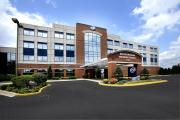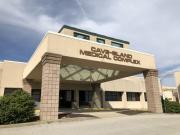Genetic Counseling
Schedule an Appointment
Schedule an appointment with our genetic counselor by calling 270-688-3445, option 4. A referral is preferred, but not required.
Genetic counseling is part of precision medicine, a form of medicine that uses information about a person’s unique genetic makeup to prevent, diagnose and treat disease.
Using the results of genetic tests, genetic counselors help people determine their likelihood of getting a certain type of hereditary cancer, which is cancer caused by an inherited gene mutation, or change, that’s passed down from parents to their children.
“Genetic counseling is a unique combination of learning about molecular/medical genetics and translating that knowledge to help people understand their risk and the risk of family members to develop particular types of cancer,” says Jodie Huff, MS, certified genetic counselor at Owensboro Health.
When should I see a genetic counselor?
You may want to see a genetic counselor if you have a family history of cancer, if you’ve recently been diagnosed with the disease, or if you had cancer at a young age.
If you have cancer or have had it in the past, genetic testing can help you and your doctor make decisions about how to treat and manage the disease. If you’ve never had cancer but have a family history of the disease, testing can help you understand your risks and the risks of your other family members.
Testing can also help you and your doctor determine whether risk-based preventive strategies make sense, including whether prophylactic surgery—surgery performed to prevent cancer—is an option.
What will a genetic counselor do?
During your meeting with a genetic counselor, you’ll go over your family health history together and talk about any risks you may have for certain types of inherited cancer. You’ll also talk about available screenings.
Based on your conversation and your personal and family health histories, your genetic counselor will decide whether you’d benefit from genetic testing. If you decide on testing, they’ll explain the possible results and what they may mean for you, as well as privacy laws on genetic information.
Your genetic counselor will also schedule your testing and call you once they’ve received the results. In addition to explaining your results to you, they’ll advise you on how to talk with your family members about the results, and what to do next, such as additional testing or screening.
How can I prepare for my appointment with a genetic counselor?
The best way to prepare for a consultation with a genetic counselor is to gather information about your family’s medical history beforehand.
Consider:
- Asking whether anyone in your family has undergone genetic testing.
- Bringing any medical records or pathology reports (lab tests from biopsies, surgeries or other tests) related to your personal or family cancer history with you to your appointment.
- Learning whether members of your family had cancer, at what age they were diagnosed, and which type of cancer they had.
You should also contact your insurance provider about whether genetic counseling and testing is covered under your policy. If your genetic counselor decides genetic testing is appropriate, they can work with you and your insurance provider to explain the medical importance of testing and determine your coverage before it’s performed.






